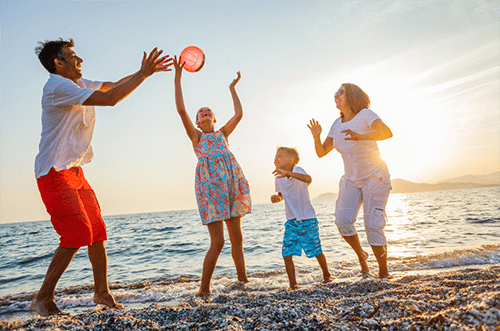Sun Poisoning and Safety 101: A Guide to Sun Protection

Have you or your family experienced sun poisoning? As the sun’s warm rays beckon us outdoors, it’s crucial to prioritize sun safety for you and your loved ones. While basking in the sunshine can be relaxing, it’s important to use sunscreen to protect your skin from harmful UV rays.
Sun exposure can have serious health consequences like sunburn, skin aging, eye damage, and skin cancer. Even just a few serious sunburns can increase the risk of developing skin cancer.
How to Protect Yourself from the Sun
- Choose a broad-spectrum sunscreen that protects against both UVA and UVB rays. Look for child-friendly formulas with an SPF of 15 or higher when applying on children.
- Seek shade: Whether it’s a beach umbrella, a shady tree, or a picnic shelter, shade is the best way to protect from harmful UV rays. It’s also a good idea to plan indoor activities to take breaks from being sun-exposed.
- Protective clothing: Double up your protection with clothing that covers – a rash guard, t-shirt, or a beach cover-up can fight off additional exposure.
- Hats and sunglasses: Eyes can be particularly sensitive to the sun, so choosing shady accessories can help offer protection while still allowing your child to run and play.
- Set a timer: Limiting time in the sun helps decrease the amount of exposure to UV rays. The sun is strongest between 10 AM and 2 PM – so that might be a good time to head inside and take a break from the summer fun.
Best Practices for Using Sunscreen Safely
- Children should only use sunscreen with supervision to avoid accidental ingestion.
- Regularly apply a broad-spectrum: Use an SPF of 15 or higher – even on cloudy days!
- Be sure to reapply regularly (every 2 hours, or more often if swimming or sweating).
How to Treat Sunburn
Despite our best efforts, sunburns can still occur. Here are some tips to help ease the discomfort:
- Cool compresses: Apply cool compresses or take cool showers to soothe the skin. Avoid using ice directly on the burn, as it can further damage the skin.
- Hydrate: Drink plenty of water to stay hydrated and support the healing process.
- Moisturize: Apply a gentle, fragrance-free moisturizer or aloe vera gel to provide relief and prevent excessive drying of the skin.
- Over-the-counter pain relief: Consider using over-the-counter pain relievers like ibuprofen or acetaminophen to alleviate discomfort. Always follow the instructions and consult a healthcare professional for appropriate dosages for children.
- In severe cases, sunburn can become sun poisoning with symptoms like blistering, severe pain, fever, or dizziness. If these symptoms persist or worsen, it’s important to consult a healthcare professional.
- Seek medical attention if a sunburn or sun poisoning becomes severe.
What Should I Do If Someone Swallows Sunscreen?
If you suspect someone has accidentally ingested sunscreen, it’s essential to take prompt action:
- Rinse the mouth: Have the person rinse their mouth with water or drink a small amount of water to help dilute any residual sunscreen.
- Contact Poison Help if you have concerns or notice any adverse reactions. To get connected to a poison control center nearest you call 1-800-222-1222 to speak with a live poison control expert or use our Get Help tool to receive an immediate recommended course of action.
Enjoying Summer Safely
When it comes to sun safety, prevention is key. Follow best practices for safe sunscreen use, especially with children, and keep an eye out for accidental ingestion. In case of a sunburn or sun poisoning, take steps to alleviate discomfort and seek medical attention if necessary. Lather on the sunscreen, wear protective clothing, and have a safe and sun-filled summer!
If you have questions about sun safety or related products call Poison Help at 1-800-222-1222 or visit PoisonHelp.org. Our poison control experts are standing by to help!